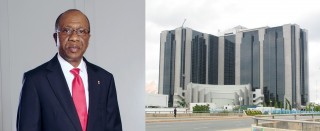The Governor of the Central Bank of Nigeria, Godwin Emefiele, has finally unveiled the flexible exchange rate policy. This comes barely two weeks after he announced at the Monetary Policy Committee meeting that he was going to allow the Naira float freely at the interbank market.
Here is what the CBN governor stated during the announcement which was aired by CNBC Africa:
“CBN will launch a foreign exchange interbank trading window on Monday to boost the supply of hard currency in Nigeria. The new window will have eight to ten primary traders handling minimum volumes of $10 million.The new system will help with economic growth and restore investor confidence,” he said. “The precise guidelines will be published later on Wednesday.”
According to Reuters, the CBN governor also stated that the window’s exchange rate will be purely market-driven.
“Nigeria will introduce fx primary dealers to operate with others in the interbank market. Under the new structure the 41 items previously not banned from getting access to forex in Nigeria will remain unchanged.Nigeria’s Forex Reserves is robust an can cover five months of import,” said Emefiele. “The time is right to reintroduce a flexible interbank forex market. Forex market will operate as a single market structure.”
What does this mean?
CBN is shutting the window for buying dollars at the official rate
Analysts have called this a ‘semi-float’ since the Central Bank still plans on holding on to the official exchange rate of N199 per US dollar for funding “critical transactions.”
According to a Senior Research Fellow at the Centre for the Study of the Economies of Africa, Dr. Solomon Olakojo, allowing the Naira to float freely means that the government is leaving the forces of demand and supply to determine the foreign exchange rate. This means that the more people demand for the Dollar, the more they will pay for it in Naira. For instance, during the resumption of schools abroad, affected Nigerian parents will demand for Dollars thereby leading to an increase in the exchange rate of a Dollar to the Naira. During this period, banks will likely set their own exchange rate based on demand in order to sell to those willing to buy at higher rates.
Following this announcement, Nigerians will not be able to buy US Dollars at the CBN rate of 199. This means that people who want to make payments for school fees, business, tourism, medicals, holiday and other bills will not be able to buy at 199. They are now left at the mercy of the inter-bank market determined rates.
Banks, importers and individuals who also engage in round-tripping or arbitrage (buying funds from the Central Bank of Nigeria’s official market at low rate and resell in the parallel market at higher rates) – will not be able to do so anymore.
There is no significant inflow of the Dollar to meet about 70 percent of the demand. Therefore it is still unclear whether this move will work considering the fact that Nigeria does not have the required operational framework in place to ensure that it achieves the desired result. Nigerians cannot bet on the Dollar dropping below N300 anytime soon.








